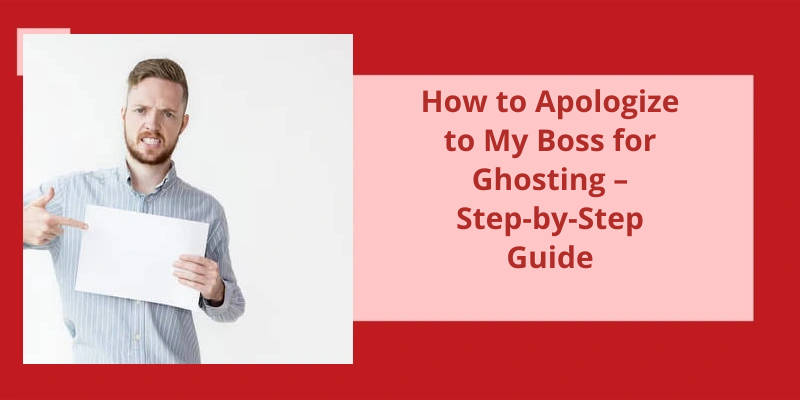In professional settings, maintaining effective and open lines of communication is of paramount importance. However, there are times when unforeseen circumstances or personal reasons may lead us to inadvertently disconnect or ghost our bosses, which can have significant consequences. Ghosting, the sudden and unexplained disappearance from communication, can sever relationships, damage credibility, and hinder future opportunities. If you find yourself in a situation where you’ve ghosted your boss and are now seeking to mend the fractured connection, it’s crucial to approach the apology with sincerity, humility, and a genuine desire to rebuild trust. This step-by-step guide will provide you with essential tips and a framework to craft an effective email, expressing your remorse for discontinuing communication and expressing your ongoing interest in pursuing a positive working relationship, should your boss be willing to give you that chance. It’s vital to acknowledge that ghosting is generally regarded as unfavorable behavior, and your actions may have potentially burned the bridge. However, acknowledging your mistake and taking responsibility for it can be an important first step towards reconciliation and potentially repairing the professional relationship.
What if a Ghoster Apologizes?
Apologizing for ghosting your boss can be a delicate and crucial step towards rebuilding trust and maintaining a healthy professional relationship. It’s essential to approach this with sincerity and a genuine understanding of the impact your actions may have had on your boss and the work environment. Firstly, take the time to reflect on your reasons for ghosting, acknowledging any personal or professional reasons that may have contributed to your behavior.
When apologizing, be sure to take full responsibility for your actions and express genuine remorse. Clearly communicate your understanding of the negative consequences of your actions, highlighting the disruptions it may have caused. Emphasize your commitment to rectify the situation, demonstrating a desire to make amends and regain your bosss trust.
In your apology, outline concrete steps you plan to take to prevent future instances of ghosting. This could include implementing better communication strategies, setting up regular check-ins with your boss, or actively seeking feedback and addressing issues promptly. Demonstrate your willingness to learn from this experience and actively work towards being a more reliable and accountable team member.
It’s important to understand that rebuilding trust takes time. Your boss may still feel hesitant about fully reinstating communication or may choose to set boundaries and expectations. Respect their decision and give them the space they need to process your apology. Stay consistent with your efforts to improve and ensure that your actions align with your words.
Lastly, it’s essential to be patient and understanding if your boss decides not to fully reinstate the previous level of trust and communication. They may need time to assess whether they can rely on you in the future. It’s crucial to accept their decision gracefully and continue to demonstrate your commitment to growth and improvement.
By taking responsibility for your actions, outlining a plan for improvement, and respecting your bosss boundaries, you can work towards rebuilding trust and restoring a healthy professional relationship.
One of the most frustrating situations in the workplace is having a boss who seems to disappear into thin air. When faced with a ghost boss, it’s important to maintain consistent updates on your progress, continue with your work obligations, and keep a detailed record of your tasks. Additionally, consider seeking support from another manager to bridge the communication gap and effectively manage up.
How Do You Deal With a Boss Who Ghosts You?
If you find yourself dealing with a boss who consistently ghosts you, it can be frustrating and demoralizing. However, there are steps you can take to handle the situation professionally and effectively. First and foremost, it’s crucial to maintain consistent updates with your boss, regardless of their lack of response. Keep sending them progress reports, updates, and any important information they need to know. This not only shows your dedication and commitment to your work, but it also keeps them informed and involved.
Another tactic to consider is enlisting the help of another manager or supervisor. If your boss is unresponsive or unavailable, reach out to someone who can advocate for you and address any concerns or questions you may have. This can provide some relief and ensure that your work isn’t being overlooked or neglected.
In addition, it’s essential to keep a paper trail of all communications, whether it be emails, messages, or documentation of deadlines and assignments. This won’t only protect you in case any issues arise, but it can also serve as evidence of your efforts and attempts to communicate with your boss.
Lastly, managing up is a skill that comes in handy in situations like these. Take initiative and find ways to proactively manage your relationship with your boss. Offer solutions, suggest ways to improve communication, and express your concerns respectfully. Taking this approach can show your boss that you’re invested in the success of your working relationship and can help resolve any issues that may be causing the ghosting behavior.
Remember, it’s important to focus on your own work and accomplishments, as ultimately, your performance is within your control.
Seeking HR Intervention: How to Involve the Human Resources Department to Address the Ghosting Behavior and Explore Potential Solutions.
- Recognize the issue of ghosting behavior
- Identify the impact of ghosting on business operations
- Conduct research on effective HR interventions
- Implement a clear communication policy
- Train managers on effective communication techniques
- Create a positive work culture and environment
- Provide regular performance feedback to employees
- Establish exit interview processes
- Offer employee engagement programs
- Develop a responsive and accessible HR department
- Encourage open and honest communication
- Build trust and rapport with employees
- Promote a healthy work-life balance
- Review and update HR policies and procedures
- Monitor and address any signs of employee dissatisfaction
- Seek feedback from employees on HR department performance
What to Do When You Are Professionally Ghosted?
When you find yourself on the receiving end of professional ghosting, it can be disheartening and frustrating. The lack of response can leave you feeling ignored and disrespected. However, if you happen to come across the person who ghosted you at a later time, it’s crucial to handle the situation with composure and professionalism.
First and foremost, it’s important to remain calm. Bitterness and anger won’t do you any favors in this situation. Take a deep breath and remind yourself that you’re a professional, and it’s crucial to maintain a level head in professional interactions. Approach the person with a friendly and respectful demeanor.
When addressing the issue of being ghosted, it’s acceptable to mention that you did send them an email (or several) without receiving a response. However, it’s essential to do so in a non-confrontational manner. Avoid criticizing or blaming the person for their lack of response. Instead, focus on expressing your concerns about the lack of communication and the impact it had on your work or project.
Furthermore, it’s crucial to demonstrate that you arent holding a grudge. Avoid dwelling on the past and instead emphasize moving forward in a positive manner. Show your willingness to collaborate and engage in productive discussions. By exhibiting maturity and understanding, you can foster a more open and communicative relationship with the person who ghosted you.
In addition, take this opportunity to rebuild trust and restore the professional relationship. Offer your assistance and support if needed, and make it clear that you’re committed to moving past the ghosting incident. Emphasize your dedication to effective and respectful communication in the future.
Act with integrity and treat others with respect, even in challenging situations. It’s important to rise above the negativity and continue to focus on your goals and objectives.
How to Prevent Professional Ghosting in the First Place
- Clear communication: Be explicit about your expectations and timelines when initially engaging with professionals.
- Establish a contract: Create a legally binding agreement that outlines the project details, deadlines, and consequences for ghosting.
- Regular check-ins: Schedule frequent follow-up meetings to ensure that both parties are on track and engaged in the project.
- Set realistic deadlines: Avoid overwhelming professionals with unrealistic timeframes that may lead to ghosting.
- Offer competitive compensation: Fairly compensate professionals for their time and skillset to increase their commitment.
- Provide a positive work environment: Foster a supportive and respectful atmosphere that encourages professionals to stay engaged.
- Respond promptly: Be timely in addressing any questions, concerns, or issues raised by the professionals.
- Show appreciation: Acknowledge and appreciate the work done by the professionals regularly.
- Build professional relationships: Invest in building strong connections with professionals to establish long-term trust.
- Provide feedback: Offer constructive feedback on the professionals’ work to help them improve and stay motivated.
Source: Professional ‘Ghosting’: What Is It, and Why Is It So Horrible?
Creating a culture where feedback is valued and ghosting is addressed is essential in professional settings. If you find yourself managing a teammate who tends to ghost, it’s important to hold them accountable for their actions while also offering guidance, especially if their behavior stems from inexperience. Don’t let ghosting slide, but approach the situation constructively to ensure it isn’t tolerated and to foster a more responsible and respectful work environment.
How Do You Deal With Professional Ghosting?
When it comes to professional ghosting, it’s important to address the issue head-on and not let it slide. If you directly manage someone who’s ghosted, it’s essential to hold them accountable for their actions. However, it’s equally important to provide coaching and support if you believe the ghosting behavior is a result of inexperience or lack of knowledge.
Creating a culture where feedback is encouraged and valued is crucial in preventing and addressing ghosting situations. By establishing an environment where open communication is valued, employees are more likely to feel comfortable discussing any challenges they may be facing that lead to ghosting. This can help identify any gaps in skills or resources and offer a solution to prevent future ghosting incidents.
Addressing ghosting in a timely manner is also important to prevent it from becoming a recurring issue. Make it clear that ghosting isn’t tolerated and outline the consequences for repeat offenses. However, it’s essential to approach the conversation with empathy and a willingness to understand the reasons behind the ghosting behavior. This may involve providing support, resources, or training to help the employee improve their communication skills and avoid future ghosting incidents.
In addition to holding individuals accountable, it’s also important to look at the broader organizational culture. Consider whether there are any systemic issues that may contribute to employees feeling the need to ghost. Are there unrealistic expectations or excessive workloads that make it difficult for employees to keep up with their commitments? Addressing these underlying issues can go a long way in preventing future ghosting incidents and fostering a culture of open communication and accountability.
Conclusion
Writing an email expressing sincere remorse for discontinuing communication and reiterating your interest in pursuing the opportunity can be a thoughtful first step. However, it’s important to acknowledge that ghosting is generally frowned upon and may have damaged the trust your boss had in you as an employee. While there’s always a chance for forgiveness and redemption, it’s necessary to recognize the potential difficulty of rebuilding that bridge. Honesty, humility, and a genuine effort to make amends are essential components of a genuine apology, and it’s by actively demonstrating these qualities that you may have a chance to repair the relationship and demonstrate your growth and commitment to professional integrity.






